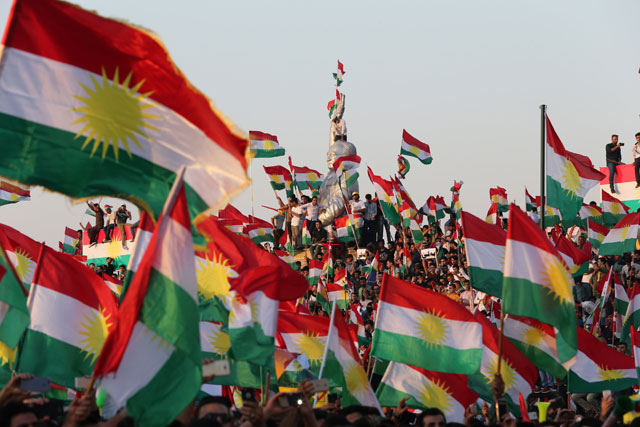ERBIL Iraq — Iraqi Kurds were preparing to vote in a referendum set for Monday on independence for their autonomous northern region, despite warnings within the country and from neighbours Iran and Turkey.
Iraq’s federal government has called the referendum unconstitutional and there are concerns the vote could lead to unrest.
Washington and many Western countries have also called for its postponement or cancellation, saying it will hamper the fight against the Daesh terror group.
But in regional capital Erbil, the political heartland of President Massud Barzani who initiated the referendum, Kurdish flags were everywhere.
Most in the city said they would vote, but some also feared the possible consequences.
“We look forward to hearing what the situation will be after September 25, as most Kurds will vote for independence to fulfil our dream of an independent state,” said labourer Ahmad Souleiman, 30.
“What we’re afraid of is that our enemies have evil intentions towards us.”
Iran and Turkey have sizeable Kurdish populations of their own and fear the vote will stoke separatist aspirations at home.
Iran’s official IRNA news agency cited a security spokesman Sunday as saying: “At the request of the central government of Iraq, all flights from Iran to Sulaymaniyah and Erbil, as well as all flights through our airspace originating from the Kurdistan region, have been stopped.”
Turkish Prime Minister Binali Yildirim again denounced the referendum on Sunday, saying it would “further fuel existing instability, lack of authority and chaos in the region”.
Some 5 million Kurds are expected to vote in the three provinces that have since 2003 formed the autonomous region of Kurdistan but also in territories disputed with Baghdad such as the oil-rich province of Kirkuk.
“We all support independence because we don’t see the benefit of staying in Iraq. But we’re afraid of plots by neighbouring countries,” 27-year-old clothes seller Kamaran Mohammed said in Erbil.
Domestic opposition
While an independent homeland has long been an aspiration in the Kurdish diaspora, the ethnic group’s two main parties in Iraq differ on how to make it a reality.
Barzani’s Kurdistan Democratic Party (KDP) and the Patriotic Union of Kurdistan (PUK) of Jalal Talabani are at opposite ends of the spectrum politically on the issue.
The PUK has backed an alternative plan put forward by the United Nations, and supported by Washington, for immediate negotiations on future relations in exchange for dropping the referendum.
In Sulaymaniyah, the PUK-controlled second city of the autonomous region, enthusiasm for the vote was muted.
“Since I was a child, I’ve dreamt of the day our flag appears at the United Nations,” said Hama Rashid Hassan, 51.
But others on Sunday were more cautious.
“I will vote ‘no’ tomorrow because I’m afraid of an embargo on the region, of civil war with the Hashed Al Shaabi [grouping of Shiite paramilitaries], and waking up and seeing Turkish soldiers patrolling,” said 30-year-old teacher Kamiran Anwar.
Sticking point
The most sensitive sticking point is Kirkuk where there was a run on food supplies in the city Saturday as residents stocked up in case of post-referendum trouble.
On Saturday, the PUK proposed to Barzani that voting not take place in disputed areas but on Sunday party official Adnan Mufti said a deal had been agreed for the referendum to go ahead in Kirkuk.
Home to Kurds, Arabs and Turkmens, Kirkuk is disputed between the federal government and Iraq’s Kurds who say it is historically theirs.
They argue that the late dictator Saddam Hussein chased them out and replaced them with Arabs.
Threats are growing inside Iraq against the Kurdish move.
“There will be a high price to pay by those who organised this referendum, a provocation aimed at destroying relations between Arabs and Kurds,” said Hashed Al Shaabi leader Faleh Al Fayad.
“As soon as the referendum takes place there will be a legal and constitutional reaction.”
The Hashed grouping of paramilitary units was created in 2014 to battle the Daesh extremist group.
Iran-backed militia Asaib Ahl Al Haq, which comes under the Hashed umbrella, urged Baghdad to “take legal measures to confront this project that threatens civil peace and national security”.
Iran’s elite Revolutionary Guards also began military exercises Sunday along the border with Iraqi Kurdistan.
Such exercises are common in the region, due to the persistent threat posed by Kurdish separatists, who regularly carry out cross-border attacks against Iranian security forces.
